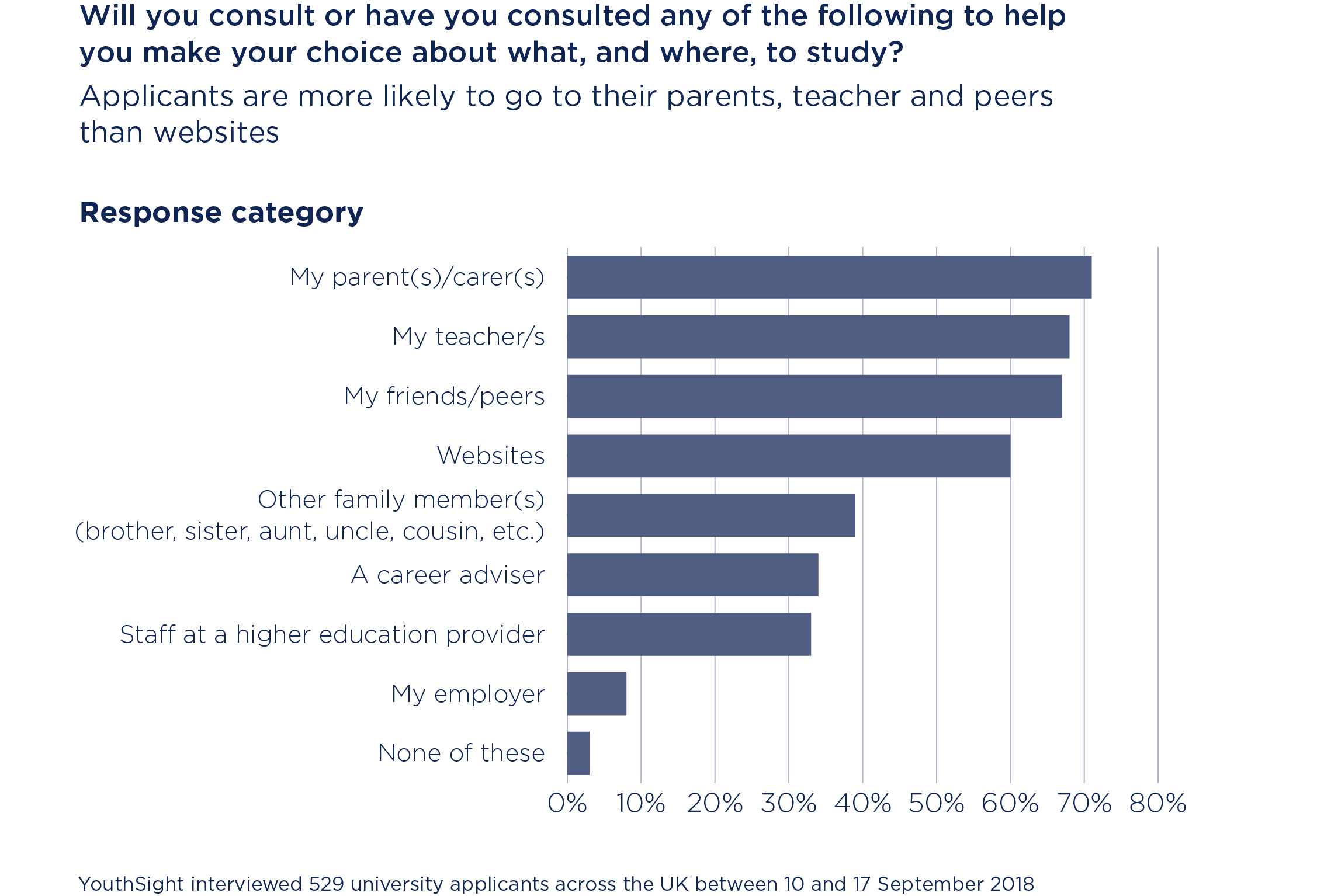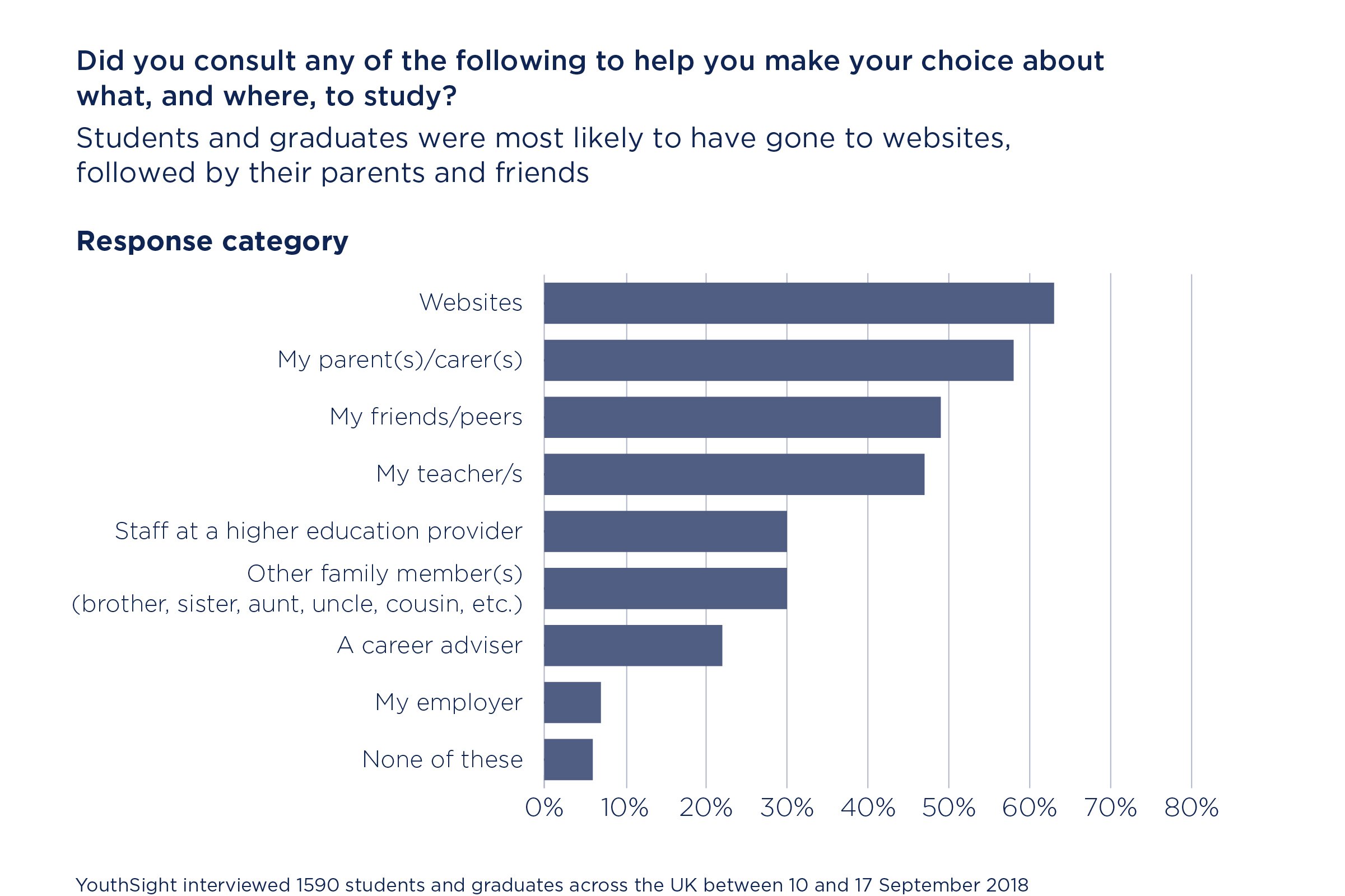Prospective university students turn to parents and friends as much as teachers for advice on their options, new polling for the Office for Students shows.

The poll, by YouthSight, comes as a new report from CFE Research calls for a more tailored approach to information provision that reflects individual students’ needs, backgrounds and preferences.
The poll sought the views of over 2,000 current, prospective, and previous higher education students. It found that 71 per cent per cent of prospective students who responded say that parents are their first port of call for advice, alongside teachers (68 per cent), friends and peers (67 per cent) and ahead of websites (60 per cent).

Among existing students and recent graduates who responded, 63 per cent said they had consulted websites, slightly more than parents (58 per cent) and teachers (47 per cent).

The CFE report echoes these findings, and points to the importance of providing information about higher education directly to parents and carers. This is particularly important for students whose parents or relatives did not go on to higher education, and who may therefore be less knowledgeable about its potential benefits, the range of available degrees and courses, and practical considerations such as costs, funding and accommodation.
More broadly, the report emphasises the difficulties many students face in trying to navigate their way through often complex and unfamiliar material. It cites clear evidence that disadvantaged students find it harder to access and use information about higher education, and calls for information about higher education to be more responsive to individual needs.
The Office for Students is working with students, universities and colleges, and other partners to improve information, advice and guidance on higher education choices. A key element of this work, which we are undertaking in partnership with the other UK higher education bodies, will involve testing the potential for a new online resource tool. The aim is to support student decision-making through a more personalised approach that will help them to identify and access the information that is most important to them. The tool would replace the Unistats website, which provides students with information about courses, teaching quality and graduate outcomes, while continuing to ensure they can access this data in an accessible and comprehensible way.
Nicola Dandridge, chief executive of the Office for Students, said:
‘The Office for Students is committed to ensuring that students of all ages and levels are able to make choices about higher education that are right for them. Whether people go to university, or choose apprenticeships, vocational courses or further education, it is crucial that they have access to independent, straightforward advice about the range of options available to them. Informed choice underpins our regulatory framework, and is integral to our student support role. It has the potential to improve access to higher education, and to contribute to positive outcomes for all.
‘With so many students turning to the “knowledge bank of mum and dad” as they make their higher education choices, it’s vital that parents and carers – as well as students, teachers and careers advisers – have access to up-to-date, impartial and comprehensive information.
‘Steering a course through the higher education information, advice and guidance landscape can be challenging for anyone. The sheer quantity of material can be overwhelming. It’s often not easy to understand, and its quality and reliability may be hard to judge. And those who would benefit most from good information – including those from disadvantaged backgrounds, and those who don’t have family and friends to turn to for advice – are often the ones least well placed to access and understand it.
‘The Office for Students has launched an ambitious programme to shape a new approach to information, advice and guidance. Drawing on the evidence of these reports and on our previous research, we are exploring options for a resource to help students navigate and make sense of their own decision-making journey. We look forward to working with students, parents, universities and colleges, and others with an interest in higher education information as our work progresses.’
The Office for Students has published a short response to the CFE Research report which also sets out the next steps we are taking to improve information, advice and guidance for prospective students.
Notes
- The Office for Students (OfS) is the independent regulator for higher education in England. Our aim is to ensure that every student, whatever their background, has a fulfilling experience of higher education that enriches their lives and careers.
- Read the CFE Research report and the OfS’s response.
- The YouthSight poll was conducted in September 2018 with 2,119 participants. The sample was split between university applicants (including prospective applicants) (529), undergraduate students (531), postgraduate students (529) and graduates (530). All participants were members of The Opinion Panel Community, YouthSight’s proprietary research panel, which comprises over 140,000 members aged 16 to 30, including 80,000 students.
- The Unistats website provides official data to help those applying for higher education courses decide what and where to study. It allows users to shortlist and compare information for undergraduate courses across the UK. Unistats is jointly owned by the Office for Students, the Department for the Economy Northern Ireland, the Higher Education Funding Council for Wales and the Scottish Funding Council.
